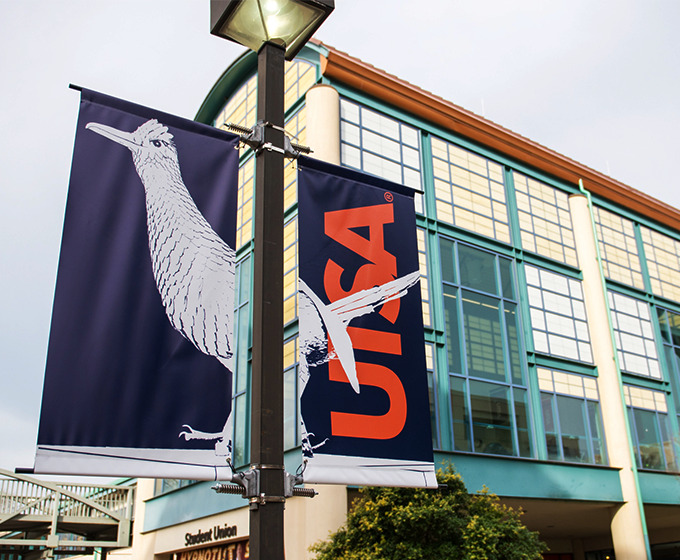
SEPTEMBER 13, 2022 — UTSA is a member of the award-winning team that was recently awarded with a new National Science Foundation (NSF) Innovation Corps (I-Corps) award valued at $3 million for five years, for a total of $15 million.
Known as the NSF I-Corps Hub: Southwest region (SW Hub), this team will help scale the NSF-led National Innovation Network (NIN), accelerating the translation of discoveries into new solutions that benefit society in the region.
The NSF reorganized the NIN in 2021 to include I-Corps Hubs, which serve as the operational backbone of the network. Hubs expand the network of universities and collaborators as well as build and sustain a broad innovation ecosystem throughout the U.S.
The Southwest team is one of only five teams in the country to receive this award. Comprised of a regional alliance led by The University of Texas at Austin, there are eight partner institutions who have banded together including Louisiana State University, New Mexico State University (NMSU), Oklahoma State University, Rice University, Texas A&M University, The University of Texas at El Paso (UTEP) and UTSA.
The three UT institutions already partner on the established Texas Venture Mentoring Service (VMS) which connects community mentors with entrepreneurial teams at the university. This group promotes commercialization and business partnership for ventures advancing through the I-Corps program to evolve into startups and small businesses. They translate the deep technology sparked on campus into products that benefit the general public and improve quality of life.
UTSA was designated an NSF I-Corps Site back in 2014, making it the first in Texas to receive this designation. To date, UTSA has trained 53 teams through regional programs and assisted 17 to succeed with national program applications.
Working closely with the Southwest I-Corps Node (now Hub) over the years, UTSA has shared instructors and best practices since its designation as an I-Corps site. UTSA has increased the program’s reach in Central Texas by connecting two of Texas’ largest metro areas, San Antonio and Austin, with its burgeoning tech corridor.
Teja Guda, the Jacobson Distinguished Professor of Innovation and Entrepreneurship, is the principal investigator (PI) at UTSA for this most recent NSF award. Since 2018, Guda has been the PI of the UTSA I-Corps Site and has participated himself in regional and national I-Corps programming with student teams. This grant will allow continued programs at UTSA to hold bootcamps, workshops for team-community engagement and coordinated intensive entrepreneurial training cohorts for students and faculty.
“UTSA has a proven track record of outreach and outcomes in the region. Our institution will continue to serve as a gateway to the San Antonio region innovation ecosystem, deploying programs for deep-tech teams in San Antonio and the surrounding area,” said Guda, who also serves as an associate professor in the Department of Biomedical Engineering in the Margie and Bill Klesse College of Engineering and Integrated Design and an associate dean of the UTSA Graduate School.
Guda will work closely with Christine Burke, who leads UTSA's Office of Commercialization and Innovation in the Office of the Vice President for Research, Economic Development, and Knowledge Enterprise, on identifying and supporting campus innovations towards commercialization. Burke has partnered with the I-Corps Site since the program began and has organized UTSA’s training workshops in addition to recruiting and managing teams. She also leads UTSA’s participation in the VMS-San Antonio and will support further engagement of university entrepreneurial teams with business mentors and services in the regional community.
“In addition to helping to define and decide the best path for an innovation, an I-Corps team puts the student or postdoc in the front position and gives them a chance to develop strong leadership and communication skills at the point when they are transitioning to their future professional positions,” Burke explained. “Whether they go on to be entrepreneurs or intrapreneurs in a larger company or institution, these skills will stay with them.”
UTSA will also work specifically with NMSU and UTEP to develop and deploy outreach strategies to broaden community participation, and conduct outreach to veterans’ organizations. UTSA’s proximity to the largest and most diverse joint base in the Department of Defense, Joint Base San Antonio, enables the institution to attract a large segment of veterans with technology innovation experience.
More than 5,800 innovators, 1,900 teams and 1280 universities, colleges, institutions and represented organizations have been trained through the I-Corps program nationally.
UTSA Today is produced by University Communications and Marketing, the official news source of The University of Texas at San Antonio. Send your feedback to news@utsa.edu. Keep up-to-date on UTSA news by visiting UTSA Today. Connect with UTSA online at Facebook, Twitter, Youtube and Instagram.
Move In To COLFA is strongly recommended for new students in COLFA. It gives you the chance to learn about the Student Success Center, campus resources and meet new friends!
Academic Classroom: Lecture Hall (MH 2.01.10,) McKinney Humanities BldgWe invite you to join us for Birds Up! Downtown, an exciting welcome back event designed to connect students with the different departments at the Downtown Campus. Students will have the opportunity to learn about some of the departments on campus, gain access to different resources, and collect some giveaways!
Bill Miller PlazaCome and celebrate this year's homecoming at the Downtown Campus with food, games, giveaways, music, and more. We look forward to seeing your Roadrunner Spirit!
Bill Miller PlazaThe University of Texas at San Antonio is dedicated to the advancement of knowledge through research and discovery, teaching and learning, community engagement and public service. As an institution of access and excellence, UTSA embraces multicultural traditions and serves as a center for intellectual and creative resources as well as a catalyst for socioeconomic development and the commercialization of intellectual property - for Texas, the nation and the world.
To be a premier public research university, providing access to educational excellence and preparing citizen leaders for the global environment.
We encourage an environment of dialogue and discovery, where integrity, excellence, respect, collaboration and innovation are fostered.